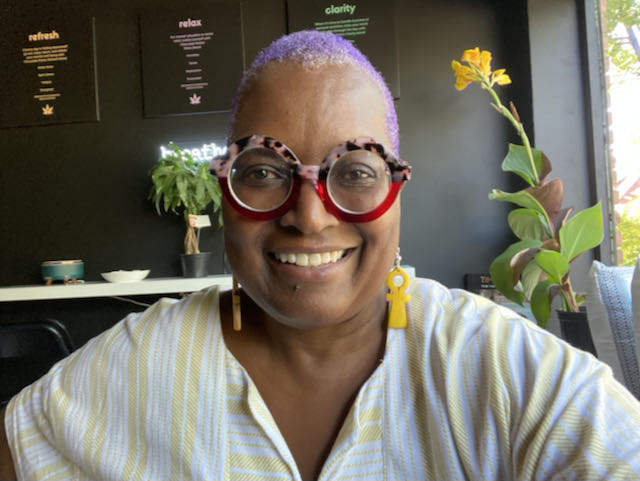contributed photo, taken at BLOOM
What isn’t often talked about in re-entry circles is what happens to Black women when they exit prison and return home.
I know how hard that return to community is. I know how extremely hard it is. Almost 20 years ago, I exited a federal prison camp.
Those days were dark and scary. Every door closed in my face. I couldn’t get a job. No one would return my calls or inquiries about employment. My saving grace was my small and mighty army of friends and family. It was their care and concern that sustained me through the hard time.
While I was away, my family, friends, sorority sisters, and church family stood with me and by me. My children were cared for and looked after; they were never in danger of being placed into foster care or separated from each other.
Because my community supported me while I was away, I had an intact home to return to. My village stretched themselves to help pay my bills, buy groceries and put a little money in my pocket. They eased some of my re-entry burden. I never felt abandoned, alone or hungry.
My re-entry experience is not the norm. Most women returning “home” (if there is a home to return to) have to fight to get their children back. They have to find housing – which is hard enough when everything is in your favor. They have to look for and obtain a job. They have to show up on time for probation or parole appointments that are usually in conflict with work hours.
What has stayed with me over the years about that time is how excruciatingly painful it was. How lack of money created anxiety and uncertainty. And if this was this hard for me, a well-educated woman with solid work experience, awards and steadfast family and friends, how hard must it be for Black women on the absolute margins? For Black women with way less than my education and support system?
This bothered me for a long time. What could I do?
The question dogged me… What could I do? How could I extend that same care and concern to other Black women?
On August 3, the day that Black Philanthropy Month’s Global Summit Series kicked off, I was proud to announce and launch The Freed Woman Fund, under The Prosperity Foundation and in the company of its Executive Director, Rev. Orsella R. Hughes. The work is in direct support of my mission, to support Black women exiting prison and returning to community.
The incarceration of women (and men) has ballooned astronomically – and unjustly – in the last 40 years. Nonprofit organization The Sentencing Project’s research on Incarcerated Women and Girls shows that there are 1.2 million women under the supervision of the criminal justice system. The female incarcerated population is over seven times higher than it was in 1980, and more than 60% of us in state prisons have a child under the age of 18. Black women make up about 6% of the U.S. population – and about 22% of the incarcerated population. In 2019, a Black woman was nearly twice as likely to be locked up as a White woman (Latinx women were in between the two groups in likelihood of imprisonment).
Black women coming out of prison face a variety of additional obstacles, including access to cash. A woman asking for money to meet personal basic needs is often shamed. She’s also often ashamed, with feelings of anxiety, depression or humiliation. She often doesn’t get to feel her dignity after serving time.
It was no accident The FWF launched on August 3. August is Black Philanthropy Month! (Happy Black Philanthropy Month!) Black Philanthropy Month is celebrating its 10-year anniversary as an organization. (And of course, Black philanthropy itself – the desire to promote the welfare of others – has been in our community as long as our Motherland ancestors, those Africans who understood collective community.) The theme of the organization this year is TENACITY–Making Equity Real.
The Freed Woman Fund answers my question: what can I do? I can care about and for Black women re-entering community from prisons, jails, and detention centers. I can help ease some re-entry burdens. It still takes a village.
I am Babz Rawls Ivy, and this is my mission.
Learn more about The Freed Woman Fund
Contact Babz directly: BRIfreedwoman@gmail.com or (203) 645-9278


Love it♥️I’m in and ready to serve in all ways.
Thank you! Thank you! ♥️
Love it!! I pray the LORD will establish your vision with resources you have not even imagine. #RebuildOurCommunities
Thank you Brother David! Amen! #rebuildourcommunities
This is very encouraging I will support!
Babz, Thank you for your service, I am looking forward to supporting and learning more
Thank you for your support. This issue is critical and needs our attention. I appreciate you caring! ♥️
Babz,
This is incredible!! So inspired by your mission, and how you’ve used your journey/testimony as a means of serving others.
Can’t imagine what the women you’re serving face. Other than monetary donations, how else can we support? Can we assist in mentoring? Can we write letters?
Thanks for all that you’re doing,
Markea
Thank you! For right now spreading the word and raising money is paramount!